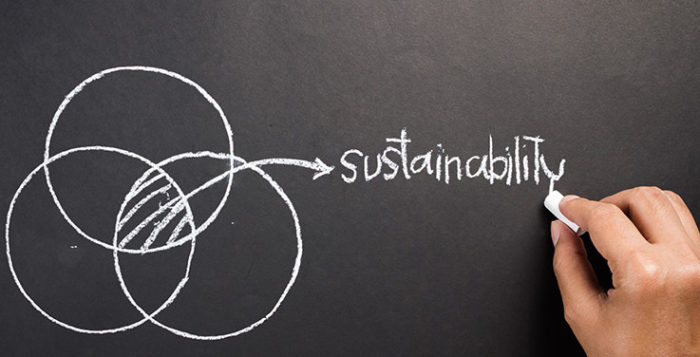Despina Panayiotou Theodosiou, CEO at TOTOTHEO MARITIME & President at WISTA International, defines what sustainability means for shipping, referring to its three pillars – economic, social and environmental – and addressing also key steps to take for action. As noted, although the industry has already witnessed much movement on these three pillars of sustainability, there is need for more; such as sharing information about successes and understanding the risks associated with climate change and the changing oceans.
SAFETY4SEA: In a nutshell, what does the word ‘sustainability’ mean to you?
Despina Theodosiou: Sustainability means understanding the future risks of your company, your workforce and your industry and acting on these risks. Sustainability for me has three pillars:
- Economic sustainability where a company remains profitable.
- Social sustainability where one is aware of societal demands on how people are treated – and here I can point directly at issues relating to gender and diversity; and
- Environmental sustainability where one is aware of risks associated with carbon emissions, ocean health and other impacts that you as a person, or you as a company, can influence.
These three corners of sustainability all influence each other and in a fast-changing world – and industry – if one is weak then we will have significant problems.
S4S: How would you assess/ describe the current status of shipping with respect to sustainability?
D.Th.: There has been a significant shift in how shipping companies address sustainability. On the economic front, I can see the uptake of digital solutions as proof that companies are seeking management and business efficiencies that they had not sought before, proving that they are at least trying to be future proof.
On the environmental side of sustainability, I see more regulatory compliance and the agreement by shipowners to travel down the road to decarbonization is, of course, a step that should not be underestimated. Just a few years ago shipowner associations were reluctant to make such statements. Seeing them support the goals of the IMO, gives a lot more reassurance that the 2050 targets can be met.
On the societal sustainability front, the support for WISTA has grown significantly, as has our membership numbers. Organisations are taking the need for diversity and inclusion more seriously, and it is a conversation that we are having with great concern for the future and for how our industries are evolving.
S4S: What are your suggestions to move forward?
D.Th.: I am generally happy that there has been so much movement on these three pillars of sustainability. But there can always be more. One of the fears is if complacency sets in and any good results are rolled back. We need to ensure this forward momentum is kept up. Another concern is protectionism. It raises the risk of national rules and regulations that may fly against the road to international efforts to address environmental issues such as decarbonization.
S4S: What could be the biggest shipping challenge in the years to come with respect to sustainable shipping for the industry stakeholders?
D.Th.: As I mentioned, protectionist measures, and with that the risk of trade wars. These can polarise nations and lead to wide-ranging problems for a global industry that relies on global trade.
S4S: Which are the key drivers and barriers towards sustainable shipping?
D.Th.: One of the growing drivers to sustainable shipping is finally the awareness of financial institutions that they can play a significant role in this. Some notable changes are going on, and they now see sustainability and governance as part of their investment risk portfolio which means they can, and as we have seen, will withdraw investments in non-sustainable companies in the face of environmental challenges.
One of the growing drivers to sustainable shipping is the awareness of financial institutions that they can play a significant role in this.
S4S: When it comes to tackling the shipping challenges with respect to sustainable shipping, what are the top three priorities on your agenda?
D.Th.: The key priorities are:
- The need to respect and realise the economic benefits of diversity and inclusion from grassroots upwards
- The need to understand and prepare for decarbonisation – this is a long-term goal, and, as an industry, we need to mitigate risks and optimise opportunities
- Companies need to know how digitalisation will help with transparency (which is a growing demand amongst parts of our industries), with efficiency and with attracting the right people for our future industry needs
As an industry, we need to respect and realise the economic benefits of diversity and inclusion from grassroots upwards.
S4S: What is your organization doing differently and/or more effectively in order to prepare for a more sustainable future?
D.Th.: At Tototheo Maritime, we work with our clients to recognise some of their future risks and look at the technologies and services they are likely to need. These are not easy discussions, but there is always a starting point and a journey. For us, as a company, it is crucial to stay ahead of the game and to be prepared.
S4S: Is there anything you would like to see other industry’s stakeholders to do differently or better?
D.Th.: While it is reassuring to see the steps being taken by our industries, I still think there needs to be more action. We often hear and read about the need for change. The time for talking is over. Companies need to act now; they need to show each other and encourage each other to take these steps.
S4S: How can the international maritime community best support a robust sustainable development? Any suggestions?
D.Th.: Taking on from my answer to the previous question, I would say there is a need to recognise and encourage action on the three pillars to sustainability, as well as sharing information about successes. Understanding the risks associated with climate change and the changing oceans, as well as our changing industries in every aspect, and preparing for this, is part of profitable sustainability.
S4S: What do you see as the defining sustainability trends driving industry toward 2050?
D.Th.: One of the main changes in the move to 2050, will be the generation shift. Those of us in senior leadership positions will have handed over the reins to people who are just leaving school today. These school leavers have grown up with a new set of ideals and a fresh awareness of what can be achieved. The industry leader of today will either be vilified for corporate greed and selfish action or seen as heroes who helped set up our future leaders to achieve the results and the level of sustainability that is needed. This trend starts now, and we should all aspire to the latter example.
The views presented hereabove are only those of the author and not necessarily those of SAFETY4SEA and are for information sharing and discussion purposes only.
 Despina Panayiotou Theodosiou is joint Chief Executive Officer of TOTOTHEO MARITIME, a leading global supplier of equipment and services for satellite and radio communications as well as bridge navigation systems, automated applications, ship repairs and operational efficiency solutions. Despina is President of WISTA International and board member of various organizations like the Cyprus Shipping Chamber, the Cyprus Maritime Academy etc. Leading international shipping publication Lloyd’s List selected Despina as one of the Top 100 Most Influential people in shipping in 2017 and she attained a further credit as one of Lloyd’s List’s Top 5 Next Generation executive. She holds degrees from the National and Kapodistrian University of Athens, the Copenhagen Business School and the University of Oxford – Said Business School.
Despina Panayiotou Theodosiou is joint Chief Executive Officer of TOTOTHEO MARITIME, a leading global supplier of equipment and services for satellite and radio communications as well as bridge navigation systems, automated applications, ship repairs and operational efficiency solutions. Despina is President of WISTA International and board member of various organizations like the Cyprus Shipping Chamber, the Cyprus Maritime Academy etc. Leading international shipping publication Lloyd’s List selected Despina as one of the Top 100 Most Influential people in shipping in 2017 and she attained a further credit as one of Lloyd’s List’s Top 5 Next Generation executive. She holds degrees from the National and Kapodistrian University of Athens, the Copenhagen Business School and the University of Oxford – Said Business School.
































































